Introduction
Most of my life I was blissfully unaware of the Marx Brothers. Of course I had seen the occasional clip on television. I had also endured scores of Groucho wannabes (like Gabe Kaplan, Hudson Brothers, etc) on sitcoms and variety shows. But outside of a few scattered inferences, I thought the Marx Brothers were just another version of The Three Stooges. Au contraire. What might surprise the unfortunate reader of this prattle, is that I came to discover the Marx Brothers because of Norman Cousins, the famous doctor who overcame his cancer with the assistance of laughter, via old comedies, including the Marx's. I had faced a medical trial in recent years, and so I became interested. I had also remembered reading a chapter in Danny Peary's "Cult Films" on the film "Duck Soup". Peary's comments did not posses me to rent the film, but I came back to it, now interested in the Marx's. I soon after managed to find a rental copy of "Duck Soup" and the damage was done! Up to this time, my favorite comedy team was Monty Python. They still are, but the Marx's are a close third (the Goons being #2).
However, it will not take a degree in rocket science, or even basket weaving, to see why the Marx's appeal to me. If you are at all familiar with Monty Python and/or The Goons, you know they were both masters at anarchic comedy. And both British teams owe a large debt to the Marx Brothers. In fact, I see a somewhat logical progression from the Marx's, through the Goons, to Python. The Marx Brothers spent most of their lives in Vaudeville and that certainly was evident in their films. As some may know the Marx Brother's first three movies were stage plays adapted for the screen. And most, if not all Marx films had the stage element about them. The Goons were certainly from the British version of Vaudeville; Music Hall. Though the Goons were basically a radio team (they made only one feature film, and several shorts), they were able to pack as much anarchy into a half hour radio show as the Marx's did over the course of a film. Yet the Goons were fettered (as the Marx's often were) by the conventions of variety showmanship. Most Marx Brothers films are weighted down with sappy love stories, stupid songs, shallow villians, etc. Even during all the fun with the Goons, you had to sit through two musical numbers. Monty Python was finally able to break free of the ball and chain of variety. Each half hour show made no concession to star guests, musical interludes or stand up. Although all of these conventions were targets for satire. Yet, I digress...
I wish to make clear that I simply wish to make a few comments about the Marx Brothers films. No more.
Marx Media
As of the writing of this broadsheet, all of the Marx Brothers films have finally been issued on DVD. Sadly they are not the same thing that was seen in theaters, as only the television prints exist, which edited some of the footage out ("Horsefeathers" especially). But something is better than nothing, I suppose. This is not meant to be an exhaustive guide to all the media available about the team, that would take a whole separate monograph, but these are the more essential ones, according to my skewed view.
OK, on with the nonsense...
In A Nutshell
Following the title of each film I have created the following template for listing the cast of characters;
Groucho - No other Marx brother is as instantly recognizable or as well known as Groucho. His characature remained constant in all the films, save "Love Happy", where he actually displayed his own facial hair instead of his trademark greasepaint. As the smartass/crumudgeon, his character was the same in all films, save "Room Service", where he almost played it straight.
Harpo - Childlike Harpo will always be the most likeable of the troupe. His on-screen silence empasized his youthful nature, whether mocking all around him, chasing females or strummin' his harp.
Chico - As the faux-Italian, Chico was the streetwise con-artist with a golden heart. His trademark was mangling the language with puns and wordplay.
Zeppo - Alas poor Zeppo, the character without a character. The team's straight man for their first 5 films, had a nice singing voice, but had no place to compete with the broad characters of his brothers.
Sappy Gal - The Sappy Gal was the gooey love interest for the sappy guy.
Sappy Guy - The Sappy Guy was the gooey love interest for the sappy gal.
Rich Olde Woman - Most often played by stalwart Margaret Dumont, this character was primarily the straight-woman for Groucho's barbs.
Bad Guy - In order for some kind of plot to happen, the Bad Guy was a made-to-order meanie of varying degree.
Femme Fatale - In order to catch Groucho at a disadvantage, Bad Guys would enlist the services of a Femme Fetale.
Plot - I have done so for the simple reason that most of the primary characters in the Marx films fit into those catagories, which is not to infer that their films are all the same, but they did follow a vague formula most of the time. And it makes the plots easy to capsulize. Yet the Marxes always rose above even the most bathetic storylines.
THE COCOANUTS (1929)
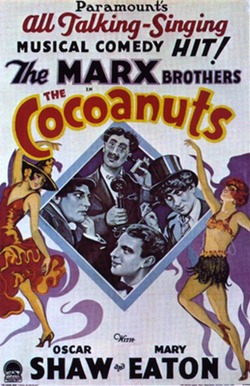
Groucho - Mr. Hammer, hotel manager
Harpo - guest*
Chico - guest*
Zeppo - Jamison, an assistant
Sappy Gal - Polly Potter (Mary Eaton)
Sappy Guy - Bob Adams (Oscar Shaw)
Rich Olde Woman - Mrs. Potter (Margaret Dumont)
Bad Guy - Harvey Yates (Cyril Ring)
Femme Fatale - Penelope (Kay Francis )
*Neither Harpo or Chico's characters have names, until the party at the end when they have fanciful plays on their stage names, Chico become Segnor Pastrami and Harpo becomes Harpaigno, or something...
Plot: Bad Guy and Femme Fatale hatch a plan to steal Rich Olde Woman's diamond necklace. This will allow Bad Guy to marry Sappy Girl by putting the blame on Sappy Guy, a budding architecht. This takes place at the Hotel de Cocoanut where Groucho and Zeppo work and Harpo and Chico are havoc-raising guests. Rich Olde Woman's necklace is stolen by Femme Fetale and hidden in a tree trunk. Durning an land auction held by Groucho, the necklace is found and Sappy Guy is framed and Sappy Gal weeps as Rich Olde Woman forces her to marry Bad Guy. The film ends with a party, during which Harpo presents Sappy Gal with evidence that Bad Guy really stole the necklace. Then Sappy Guy shows up, after being broken out of jail and gets to marry Sappy Gal and they live happily ever after.
Sound, what a concept! This early talkie is the first Marx Brothers feature film (they had done a silent film called "Humor Risk", which the team hated, and has never seen the light of day). Based on the stage play of the same name, it was released just before the crash of the stock market in 1929. One of the films most curious aspects are the songs, penned by the great Irving Berlin. It's rather doubtful that the world will remember such gems as "Monkey Doodle-Do" or "Tale Of The Shirt", but they are there (with a few other forgettable tunes), ready to be scanned over with extreme predjudice. Legend has it that Irving Berlin was unhappy that many of his musical numbers were cut for the film, but in the fullness of history, the derth of tunes only helped the film. And being a primitive talkie, it has some charming reminders of the hard time filmmakers had with sound. Any type of paper is soaking wet, since the crackling paper would peg the microphones. And it is painfully obvious when they start the gramaphone that accompanies the songs. One must certainly have sympathy for the camera operators, since the big bulky cameras track and pan with the finesse of a drunk elephant. Often the poor chap is playing catch up with the swift moves of the actors. The quality of the film varies from scene to scene as well, and sometimes it looks like 3rd generation prints were inserted at random intervals. Yet, these just add to the charm of the movie.
For all of it's little technical obstacles, "Cocoanuts" boasts some innovate camera work. It was certainly one of the first films to use overhead camera. If you are a serious Marxist, you'll find yourself reaching for the FF button during all of the musical numbers. They may have been charming in the late 20s, but they are very klutzy and hard to watch nowadays.
The film's opening number, "Lovely Florida By The Sea" is perhaps the best tune (which isn't saying much). During the course of the song we see postcard poses of happy flappers lounging on the sunniest Floridian beach to be found in a Long Island soundstage. A chorus of chubby-thighed dancers kicking sand in the air is the finish to the monumental opener. Perhaps the silliest of all the numbers is "Monkey Doodle-Do", a kooky bit of musical puffery which climaxes with a chorus line done-up in monkey fur. However, when it comes to sheer weirdness, "The Tale Of The Shirt" walks away with the crown;
I want my shirt, I want my shirt
I can't be happy without my shirt
It was given to me by my brother Bert,
That's why I love this shirt.
The romantic leads, Oscar Shaw and Mary Eaton, set the preceedent for most Marx films to follow; a pair of mawkish, forgettable goodie-too shoes who are as bland as the Marx Brothers are funny, which just makes the Marx's more appealing. Bob & Polly's theme song "When My Dreams Come True" is repeated a few times, when they're not cuddling up for cute antics. Polly's mother, played by Marx stalwart Margaret Dumont, set's the tone for the haughty matron that she'll play in most of the team's movies. Cyril Ring and Kay Francis make for a rather soporific pair of baddies, but move the plot along.
As far as the Marx's go, the film has some good moments. Probably the best sustained scene is the 'swapping bedrooms' bit, where the three Marx's sneak and slam their way between two women's bedrooms. But my fave gag is the non-sequetur reenactment of Willard's famous "Spirit Of 76" painting by the Groucho, Harpo and Chico in the hotel lobby. Of course the film's most famous bit is the Groucho/Chico "Why a duck" segment;
Groucho "And along the riverfront, those are all levies"
Chico "That's the Jewish neighborhood?"
Groucho "No, we'll passover that.",
Poor Zeppo sets a precident for the next few films as Groucho's stiff valet, full of such gems as "Mr. Hammer, Oh he'll be here directly." and has little to say beyond that. During a big dinner party, where the Marx's dress up in elaborate costumes, the film plot gets tied up and the baddies head to the hoosegow and our sappy pair are united again. All in all, THE COCOANUTS makes for an entertaining package, and though it pales compared to some of the latter Paramount films, it's certainly better than the team's final movies.
ANIMAL CRACKERS (1930)
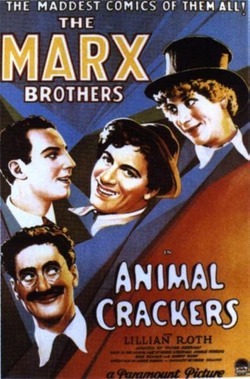
Groucho - Captain Geoffery T. Spalding, adventurer
Harpo - The Professor
Chico - Signor Emanuel Ravelli, a musician
Zeppo - Horatio Jamison, an assistant
Sappy Gal - Arabella Rittenhouse (Lillian Roth)
Sappy Guy - John Parker (Hal Thompson)
Rich Olde Woman - Mrs. Rittenhouse (Margaret Dumont)
Bad Guy - Rosco W. Chandler (Louis Sorin)
Femme Fatale - Mrs. Whitehead (Margaret Irving)
Plot: Groucho has returned from Africa to a grande reception in the house of Rich Olde Woman. In his honor, Bad Guy, an art collector, is displaying Beaugard's painting "After The Hunt". The Sappy Gal and Sappy Guy hatch a plan to replace the painting with the Sappy Guy's version so Bad Guy will see what a great painter Sappy Guy is. The Femme Fatale and her sister hatch the very same plan, to spoil Rich Olde Woman's party. A comedy of errors ensues as the real painting is stolen and swapped and reswapped for the copies. In the end Bad Guy sees what a great artist Sappy Guy is all live happily ever as they are all put to sleep by Harpo's sleeping potion.
This is the second Marx film to be based on a stage play, "Animal Crackers" marks several significant improvements over its predicessor. The look of the film is a bit more lavish and consistant (there aren't any wild shifts in film quality as there are in "Cocoanuts") and in the year since the Marxes made their first film the studios had worked out many of the bugs in sound recording. The plot revolving around a stolen masterpiece painting gives makes for a very low key tale, much less so than in THE COCOANUTS. So there's not much plot tension to keep things moving, so the characters just wander around the large set from scene to scene, not really caring about the crime. At the outset of the film all the players are abuzz about this famous painting that is going to be displayed, taking in hushed tones like it's some secret, then after the theft of the painting they're yanking and pulling the canvas around like an discarded tablecloth.
One the up side there are some great non-sequitors in the flim. The best is when Harpo and Chico sneak in at night to steal the painting, and seeing the rain outside, Chico mentiones "a shortcut" and Harpo opens another set of doors to a bright, sunny day and Chico says "California!" and they parade off into the sunshine. Also, Harpo's entrance into the film concludes with him firing a cap-gun at everybody, including a statue, which fires back. But perhaps the most unusual part of the movie is the elaborate set, filled with strange monuments that look like relics from a power station or a Fritz Lang sci-fi epic.
Groucho's asides to the camera are among his best in their career. His "Weird figures" speech is quite funny. But my all time fave of Groucho's asides is when he says "Well all the jokes can't be good, you've got to expect that once and a while!". His monologue includes the famous "I shot a polar bear in my pajamas" bit. Zeppo's is in there somewhere, but it's a chore to find him. And you can see him occasionally, wishing he had something interesting to say. Alas, poor Zeppo. At least he got a bigger part in the next film.
Probably the oddest thing about the film is the romantic couple. Arabella, played by the famous Lillian Roth, is probably the best and worst thing about the film. Her performance is so rediculously hammy that one is left cringing upon every line she speaks. And though her gestures are broad enough to telescope to the back of the theatre, she is so energetic and likeable that it's kind of delightful to see her over the top throughout the movie. Which makes her a great foil for Hal Thompson, her amour John Parker, who's a stiff, with skin so pale that his lips look redder than Roth's. And so is his performance, pale that is, as joins the long line of dull leading men in Marxdom.
As in COCOANUTS, Margaret Dumont plays the dominating mother, who endures advances from both Groucho and Louis Sorin's Rosco Chandler. Sorin is as close as we get to an antagonist in the film, and makes for easy pickings for Harpo & Chico's jibes, but Margaret Irving's attempts to spoil the big reception makes for the good byplay. Probably the best sustained scene in the film is when Dumont and Irving play a game of bridge with Chico and Harpo, which takes several views to catch all of the gags.
ANIMAL CRACKERS was the last Marx film to be filmed in New York, from MONKEY BUSINESS on out they were made in Hollywood. At this time they also bid farewell to Broadway, with MONKEY BUSINESS their last show on the Great White Way, and their next film...
MONKEY BUSINESS (1931)
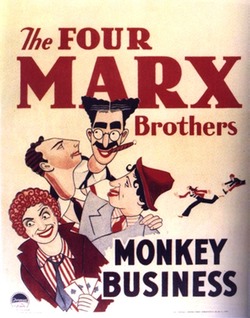
Groucho - stowaway
Harpo - stowaway
Chico - stowaway
Zeppo - stowaway & honorary Sappy Guy
Sappy Gal - Mary Helton (Ruth Hall)
Sappy Guy - see Zeppo
Rich Olde Woman - Madame Frenchy (Bess Flowers?)
Bad Guy - Alky Briggs (Harry Woods)
Femme Fetale - Lucille Briggs (Thelma Todd)
Good Guy - Big Joe Helton (Rockcliffe Fellowes)
Plot: The four Marx's are stowaways on an ocean liner, and simply run amok around the ship for the first part of the film. Then, gangster Bad Guy enlists Groucho and Zeppo as hit men to plug Big Joe Helton, another gangster, who enlists Harpo and Chico as bodyguards. Zeppo woos Sappy Gal, Helton's daughter. After going ashore, things come to a head at Big Joe Helton's party as Bad Guy's thugs kidnap Sappy Gal and the Marx's battle it out in the old barn where she's been taken. The brothers truimph and the films ends with them looking for a needle in a haystack.
Perhaps the worst thing about this film is that it has a plot. The first 20 minutes has the Marx brothers running around a cruise liner unfettered by story or supporting actors, then the script rears its ugly head and bogs the film down somewhat. Still, it is an all to rare moment in Marx filmdom that the brothers are allowed to run free for a bit.
The movie has elements from their stage play "I'll Say She Is", where the Marxes did a routine all taking place in the office of a theatrical agent (played by the same actor who played the customs inspector in the feature). It's also the last Marx film that had been performed as a stage play it was filmed (though they did still tours for subsequent films to test audience reaction and hone the gags). After "Monkey Business" the films were based on screenplays only.
This is the first Marx movie that wasn't filmed in New York, as the team had emigrated to Hollywood. As far as the brothers are concerned the biggest change is that Zeppo was given an actual role, rather than acting as Groucho's assistant. Zeppo does an appreciable job of playing the romantic lead, somewhat hampered by his stiff presence. Ruth Hall is the perfect pairing for Zeppo, a sqeaky, meek flapper with a thick north-eastern accent, and seems just about as stiff as Zeppo.
Much more fun is Thema Todd, who plays the brassy wife of gangster Alky Briggs, and is a terrific foil for Groucho's leers. Todd's energy matches the rest of the team (well, save Zeppo) and is responsible for keeping the relentless pace of the film up. The remaining leads, gangsters Joe Helton and Alky Briggs, are hampered by the fact they have to spew out a bunch of corny cliche lines that might have been hip in the thirties, but seem comic book today. Harry Wood's Alky Briggs gets the most silly phrases;
"You got anything to say before I drill ya?"
"I'm talkin' turkey. You can't take all the dough and run out on your pals."
And as one might expect, introducing such gangland thugs into the plot means that the dang film has got to have one. A plot, that is. Then the film denegrates into more predictable hijinx as the brothers find themselves acting as bodyguards for the two thugs. Joe Helton, the nice thug, who's squeaky daughter is Zeppo's amour, is likeable, but doesn't seem to fit the role very well. But Rockcliff Fellowes (now there's a name for ya) makes a good counterpart to the the grim Alky Briggs, which has the look and leer of a mob boss, but is so rife with cliches that he seems as threatening as a sack of wet mice. But as always, the dry performances of the supporting casts only makes the Marxes more fun to watch.
The film's opening scene with the boys singin' "Sweet Adeline" in barrels is a classic moment. Even better as they storm around this ship attacking (verbally and physically) many of the passengers and all of the crew (of course). Groucho's dressing down of the ship's captain is quintessential;
Captain "One more word from you and I'll put you in irons!"
Groucho "You can't do it with irons, it's a mashy shot. It's a mashy shot if the wind is against you, and if the wind isn't, I am!"
After the on-board insanity, the boat hits land and so does the movie, somewhat. Groucho's fling with Themla Todd is fun to watch, and gives one pause to compare Todd to Margaret Dumont. It's interesting to suppose why the team schucked Dumont (temporarily) in favor of a prettier foil for Groucho. Perhaps Groucho was tired of sparring with Dumont. Certainly Todd is much more appealing, but doesn't give Groucho the proper foil for his verbal barbs. But looking back, it seems that Dumont could have fit in this (and the following) film, but it's good to have a change, I suppose. For all of it's gangland references, the historical irony is that Themla Todd's death in 1935 at the age of 30, could have involved the mob, though it was never proved. A cheesy TV movie called "White Hot" tells the tale for those willing to suffer Loni Anderson's acting.
And I suppose every story has to have an end, and they do manage to end this wonderous farce with the team looking for a needle in a haystack in a barn. This perfect anti-climax is suitable, especially as we know that this shouldn't have been a story anyway, it should have been "Marx Brothers on a ship and on land - No plot needed" but that's not Hollywood. Thankfully we had one more film of such quality, HORSEFEATHERS.
HORSEFEATHERS (1932)
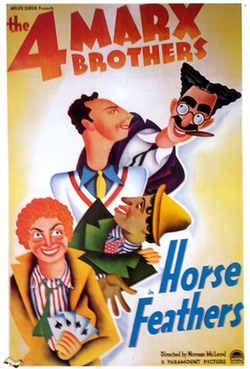
Groucho - Professor Quincey Adams Wagstaff
Harpo - Pinky, a dogcatcher
Chico - Barovelli, a bootlegger
Zeppo / Sappy Guy - Frank Wagstaff
Sappy Gal - none
Sappy Guy - see Zeppo
Rich Olde Woman - none
Bad Guy - Jennings (David Landau)
Femme Fatale - Connie Bailey (Thelma Todd)
Plot: Groucho as just been named the president of Huxley College. His son, Zeppo, convinces him to get two pro football players from a speakeasy, so that the Huxley team will win the big game. Bad Guy gets the pros first and Groucho winds up with Harpo and Chico. Femme Fatal is wooing Zeppo and Groucho to get the secret football signals so Bad Guy can assure victory for his team, Darwin College. Chico and Harpo try and kidnap the two pros and wind up being kidnapped. They escape and help Huxley win the big game after which Groucho, Chico and Harpo (but not Zeppo) marry Femme Fatale.
HORSEFEATHERS and MONKEY BUSINESS make good companions, as they both substitute a youthful Thelma Todd for Margaret Dumont and are both allow Zeppo a roles beyond being Groucho's valet. Both films have flimsy plots, or should I say situations, in which the team gets to roust about in. I've read many reviews that consider this the height of the Marx's films, as it's pure zany, and doesn't have the political overtones of the followup "Duck Soup". If you've read this far, you'll know that my favorite is the film that proceeded it, but that's that's entirely irrelephant to what I was going to talk about.
This film gives Zeppo the closest thing to a real role than in any of the films, and one wonders if his brothers didn't like it, as he was demoted to valet in the next (and his last) film. Zeppo's wooing of Thelma Todd is a bit akward, as Zeppo never was much of an actor, but his nicest moment comes when he sings "Everyone Says I Love You" to Todd. Themla Todd's 'college-widow' character is much more restrained than the sassy type she played in MONKEY BUSINESS, and much of her screen time is dedicated to being romanced by the four Marx's. I find her one of the most enjoyable parts of the film, and in some ways its a shame she didn't continue to work with the Marx's (and her untimely death would have precluded that anyway).
When the Marx's aren't playing up to Todd, the core of the film takes place on the football field. The film's climax is of course a sendup of America's other greatest sports pastime. The most novel aspect is the minimal gear that the football players wore at the time (leather helmets and padded jerseys), compared to the battle armor that's worn by today's players. And it's fun to watch the Marx's tear up the field with their hijinx. But this displays a minor weakness of the film, and that's that it lacks even less story than it's predecessor, if that's possible. So one is left to enjoy the brothers running about making a mess of everything in site.
Highlights, aside from the football game at the end are numerous. The speakeasy scene at the beginning of the film has many good gags, most of which are prohibition-related alchohol jokes. Probably the best gag is uttered while Harpo and Chico are crawling into the speakeasy and Groucho quip's
"That's no way to go into a speakeasy, that's the way you go out!"
But the film is in the main so visually-oriented, that's it's difficult to explain the gags. Their next film is the one that they will be remembered by, but for all of it's satire, I think Horsefeathers and it's companion MONKEY BUSINESS are the greatest of their genre, and once they were kicked off of the Paramount lot, it was a long, stately decline from this former glory.
DUCK SOUP (1933)
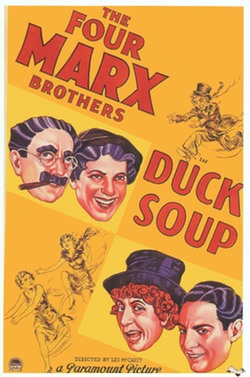
Groucho - Rufus T. Firefly
Harpo - Pinky, a spy
Chico - Chicolini, a spy
Zeppo - Bob Rolland, an assistant
Sappy Gal -none
Sappy Guy - see Zeppo
Rich Olde Woman - Mrs. Teasdale (Margaret Dumont)
Bad Guy - Ambassador Trentino of Sylvania (Louis Calhern)
Femme Fatale - Vera Marckall (Rachel Torres)
Plot: At the insistance of Rich Olde Woman, Groucho is made president of Fredonia. Bad Guy, ruler of rival country, Sylvania, enlists his spys Harpo and Chico, and Femme Fetal, in an attempt to discredit Groucho, so he can marry Rich Olde Woman and control Freedonia. Yet Rich Olde Woman is taken with Groucho. Bad Guy and Groucho insult each other until war is declared between them. Battle is joined by all four Marx brothers until they corner Trantino and win the war and throw fruit at Rich Olde Woman.
DUCK SOUP was the end of the golden era of Marx Brothers films. Most critics regard the film as their shining moment. So it was (though MONKEY BUSINESS is my favourite) and from then on it was a steady slide down. Though A NIGHT AT THE OPERA was their box-office comeback, it was a return to the Sappy Girl/Guy formula, which was a reason for it's success. The latter day Marx-head loves the Marxes when they're free to run amok, plot and supporting cast be damned. Though DUCK SOUP is their best film, it was a flop at the box office. Paramount dropped the team and MGM picked them up, with the fetters of the Sappy Girl/Guy formula that would turn them into a parody of themselves by the end.
After the two Themla Todd films, Groucho had insisted upon the return of Margaret Dumont, which gives the film a slight return to the original formula of COCOANUTS and ANIMAL CRACKERS. The film's original title was to be CRACKED ICE, but the studio wanted it changed to fit the animal-theme of their previous three film titles. Of course the overt political satire of this film made the Marx's the darlings of the campuses everywhere during the 1960s, and lead to the team's revival throughout the 1970s (though only Groucho was alive to revel in it [well, Zeppo was too, but he didn't give a crap]).
Most often, the film is pointed out as a satire on fascism, dictators, etc, but the film is also a great send-up of the Hollywood musical. Replete with over the top musical numbers, grande sets and equally ridiculous choreography, the film punches holes in the absurd chiches of the 1920s-era musical. The other great change is the complete lack of any love story, just Rachel Torres' baiting of Groucho in a one scene. This would be the only Marx film to lack that chiche. In fact the two subsequent films were anchored by romantic interests, with the brothers simply reduced to comic foils. With the ditching of that cliche, the film spends much of it's time poking fun at politics. Groucho, as the utterly corruptable politician, is finally given a worthwhile villain in the form of blustery Trantino (played by Louis Calhern). The constant tension between the two is one of the films funniest running gags. And as Calhern plays the villain with a sense of humor, it elevates the character from the one-dimensional baddies of the previous films.
Chico and Harpo, playing spies, are left to roust about in a free way, changing allegiences at the drop of a hat (or a buck). Chico gets in some of his best routines running a peanut stand, alongside lemonade vendor, played by Edgar "slow burn" Kennedy. The constant antagonisim between the two parties is one film's best moments. Another noteworthy change from the Marx formula, is the lack of any harp number by Harpo, save his strumming of piano strings for a few seconds. Groucho gets in his obligatory barbs against the forever put-upon Margaret Dumont, one of the best is delivered during a love scene when Groucho quips about "all the years he wasted collecting stamps." Outside of Dumont and Calhern, the supporting cast is excellent. Mexican actress Rachel Torres plays another spy, dressed in a series of flashy outfits, and gives Groucho someone to leer at.
Outside of the outlandish musical segments, the film's highlight is the absurd climax of the eventual war betwen the states of Fedonia and Sylvania. Groucho seems to have an endless supply of period uniforms to wear throughout the battle, and delivers his classic line
"Remember, you're fighting for this woman's honor, which is more than she ever did!"
as they get tossed about in Dumont's war-torn home. I don't know why, but one of my favorite gags is when Grouch gets a chamber pot stuck on his head, and Harpo sketches his face on it. But it all is in the name of absurdity and holds up as their most relentless film, poking fun at their government, as well as others, and laughing all the way. Sadly the film did not reach Paramount's expectations and the team were let go. But thanks to Chico's bridge partner, Irving Thalberg, the team (sans Zeppo) found a new home at MGM, and their most sucessful film to date...
A NIGHT AT THE OPERA (1935)
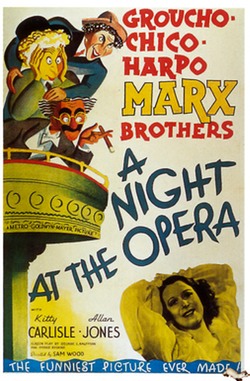
Groucho - Otis P. Driftwood
Chico - Fiorello, an agent
Harpo - Tomasso, a dresser
Sappy Guy - Ricardo Barroni (Alan Jones)
Sappy Gal - Rosa (Kitty Carlisle)
Rich Olde Woman - Mrs. Claypool (Margaret Dumont)
Bad Guy- Rodolpho Lassparri (Walter Woolf)
Sorta-bad Guy - Herman Gottleib (Sigfried Rhumman)
Femme Fatale - none
Plot: Rich Olde Woman want's to be put into society and her agent, Groucho, tells her to invest in the New York Opera Company. Sorta-bad Guy, the director of the Opera welcomes her support. We then meet Harpo, who is a dresser for Bad Guy. Bad Guy is the lead tenor for the Opera and is hot for Sappy Girl, the lead soprano. But Sappy Girl loves Sappy Guy, a lowly chorus singer. Chico, brother of Harpo (what a stretch) is a pennyless musician loafing around the Opera who becomes Sappy Guy's manager. The Opera then takes a cruise for New York. Chico, Harpo & Sappy Guy stow away. Sappy Girl is fired because she won't give into Bad Guy. Groucho is fired, too. So the team wreaks havoc on the Opera's opening night performance of "Il Travitore". They kidnap Bad Guy and substitute Sappy Guy, who sings so well that everyone hates Bad Guy and they all live happily ever after.
A NIGHT AT THE OPERA is the team's first film for MGM after being ousted by Paramount due to lackluster box-office for DUCK SOUP. Also gone is Zeppo. Zeppo Marx left the team to join the other Marx brother, Gummo, in a successful talent agency. Herbert "Zeppo" Marx was perspecatious enough to realize that performing would never be his forte', and a life of being Groucho's on-screen valet is no future to look foward to. Though he was a stiff actor with a passable singing voice, I always rather liked him, but perhaps that's because he was in their best films. Groucho has mentioned several times that he felt this was the team's best film, and certainly the movie-going public of the 1930s would agree with him.
The first thing that struck me about A NIGHT AT THE OPERA was the soft, lush look about the movie that contrasts with the crisp appearance of the Paramount films. It was clear that a large budget was lavished on the film. And while the film holds up well in the works of the Marxes, to me it's a film of resignation. The anarchic spirit of the Paramount days was given up for calculated nuttiness. There are rare remnants of the freer spirit of old in this film but successive Marx films use of the same Sappy Girl/Guy subplots, dumb songs and weak stories only get worse from here on out. This change was due to MGM's Irving Thalberg, who brought the team to the studio, making sure that the Marxes didn't dominate the flim as they'd done at Paramount. And with that format, they finished out their career. But the brothers regarded this film as their best, and there's something to be said about that, as they were well counterbalanced by a good actors and settings.
Groucho once grouched that director Sam Wood was a nut for endless re-takes and it shows, as every scene is an example of finely crafted comedy honed to such a fine edge that it's almost dull. But for all my minor gripes, the film does pack a lot of laughs and is always a joy to watch. In my view it also has the distinction of having the two least inoccuous Sappy Guy and Gal. Both Alan Jones and Kitty Carlisle are quite pleasurable to watch, which is a very rare comodity in a Marx film to have such likeable leads. For a villans, the blowhard Sigfried Rhumman was paired with effete Walter Woolf King, making for a team of trouble for the Marx's. Margaret Dumont is there of course, but they allowed here to play a stronger character, not just a ditzy old woman, but one who had enough spine to see through Groucho, though he won her over in the end. As mentioned above, the romantic leads are quite enjoyable, especially compared with the ones used in past Marx films. Alan Jones (father of Jack "Love Boat" Jones) seems a bit too wholesome sometimes, but is more than compensated by Kitty Carlisle, who has the same kind of appeal as Lilian Roth (but is a much better actress).
The first part of the film, taking place on a steam ship has some memorable sequences, especially the stateroom sequence, where dozens of people wind up getting crammed into Groucho's miniscule berth. And there's plenty of hijinx with Chico, Harpo and Jones as stowaways, who disguise themselves as aviators to get off the ship. But certainly the best part of the film the three Marxs doing their best to ruin the performance of the usurping opera company, with an endless array of gags that make one forgive the long musical numbers and other detours, which show the Marx's at their anarchic best.
A DAY AT THE RACES (1937)
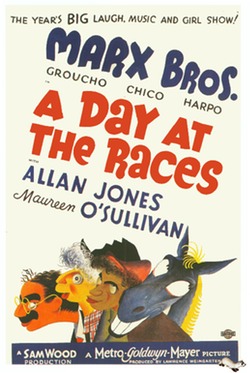
Groucho - Dr. Hugo Z. Hackenbush, a horse doctor
Chico - Tony, a tipster
Harpo - Stuffy, a jockey
Sappy Guy - Gil Stewart (Alan Jones)
Sappy Girl - Judy Standish (Maureen O'Hara)
Rich Olde Woman - Emily Upjohn (Margaret Dumont)
Bad Guy - Morgan (Douglas Dumbrille)
Femme Fatale - Miss Nora (Esther Muir)
Plot: Sappy Girl runs a sanatarium by a racetrack. Chico is her driver. Rich Olde Woman is the sanatarium's richest patient. She threatens to leave and go to Groucho, who's just a horse doctor. Chico coerces Groucho into coming to the sanitarium so Rich Olde Woman won't leave and bankrupt the sanitarium allowing Bad Guy to turn it into a casino. Harpo is a jockey who is too honest to throw a race and becomes the jockey for Sappy Guy, a singer who blew his wad on a racehorse, causing a rift between he and Sappy Girl. Bad Guy's flunkie exposes Groucho and they are cast out. Sappy Guy's horse beats Bad Guy's in the big race and they live happily ever after.
A DAY AT THE RACES was a big letdown from the previous film. The film is so cluttered with plot and musical filler that the Marxes are almost trampled underfoot in the process. The death of Irving Thalberg meant that Louis Mayer took over, and he never thought much of the team, so it's no wonder it seems less focued that the previous film. To me the fundemental flaw is placing the Marxes in a horsetrack setting, which is where you would expect them to be. What made the previous films funny was how out of place the Marx brothers were, in government, in the opera, etc. So there's way you get the satisfying dismembering of upper-crust conventions as you did in previous films.
The movie almost has the feel of a sequel, with both the leading man and baddie returning from the previous film. Maureen O'Hara replaces Kitty Carlisle as the leading lady, and it's an acceptable change. O'Hara plays a woman in control of a sanatarium, which is the first time in any Marx movie is there a leading lady in charge of things, instead of just a love interest. But I find the romance between the leads far too trite and predictable, and so is the whole villans who want to rig a horse race plot. Douglas Dumbrille is the tried-and-true heavy, who beats up Harpo (just like Woolf King did in A NIGHT AT THE OPERA) and spends most of the film shouting at various things. That leaves the obligatory femme fetale, played by Esther Muir, who gets wallpapered to a wall in one of the films few consistently funny scenes.
That leaves our protagonists/antagonists the brothers Marx. Chico has one of his very best bits in the Marx history, the 'tootsi-frootsi-ice cream' bit, which is probably the best sustained scene in the film. Harpo's best bit is when he demolishes and entire piano, only to play the soundboard like a harp. Groucho gets his big scene in the operating room, when trying to convince Sig Rhumman that Dumont is suffering from "double-bluff-pneumonia", a scene which ends with the operating theater gettng destroyed and the team escaping on a horse. And as promised, we have the grande climax, a horse race. Somehow "Marxing" a horse race is nowhere near as funny as "Marxing" the opera, but the segment does have some good bits. Mostly, it seems an exersize in overkill, such as filling up a racetrack with automobiles and showered with racegoer's hats.
On the whole, the film seems quite a letdown from A NIGHT AT THE OPERA, and a pale shadow of their Paramount years. Their next effort was a complete change of pace, then they returned to the standard formula for the rest of their film career together.
ROOM SERVICE (1938)
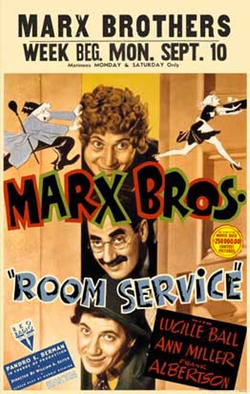
Groucho - Gordon Miller, a producer
Harpo - Faker Englund
Chico - Harry Binelli
Sappy Gal - Hilda Manney (Ann Miller)
Sappy Guy - Leo Davis (Frank Albertson)
Rich Olde Woman - n.a.
Bad Guy - Mr. Wagner (Donald MacBride)
Femme Fatale - n.a.
Plot: Groucho is producing a play called "Hail And Farewell" and his cast and crew occupy the Hotel White Way. His brother-in-law is the manager of the hotel, who is under attack from Bad Guy, an blowhard executive who threatens to boot Groucho's cast from the hotel. Sappy Guy is the playwright of "Hail And Farewell" and falls for Sappy Girl, another guest in the hotel. Harpo and Chico are part of the show too, and don't have much to do. After a bushel of humorless hi-jinks aimed at keeping the cast from being evicted and saving the show, the show is saved and the cast is not evicted and they all live tediously ever after.
Though the Marx brothers decided to play it straight (well, sorta) in ROOM SERVICE, it winds up being a bit too straight and is underpacked with memorable moments. Groucho is the only one who tries to play a different character, despite the greasepaint trademark. Much of the rest of the cast comes from the original Broadway production, but I wish they'd left Frank Albertson in New York. His whiney and too-boyish playwright is the film's biggest flaw. Followed closely by Donald McBride as the blowhard Mr. Baxter, who's over the top performance is punctuated with constant outbreaks of the mysterious oath "Jumping Butterballs!"
Zeppo Marx secured the rights for the Broadway production (which according to the film's trailer, was the highest price paid for rights to a Broadway show), and RKO produced the film. It had to be rewritten to fit the Marx characters, but you wouldn't know that from watching the film. However, the nature of the play is maintained by the fact that most of the film takes place in a couple of rooms. This just doesn't seem to be the right kind of enviroment for the Marxes, who once had large world to run around in, and now are fettered to a few small rooms, and further bounded by cliched comedy. However, one can't blame the team for wanting to break free of their past somewhat, as they had felt they were becoming victims of their own sucess. I often watch the film wondering what it would have been like if they Marx's had ditched their patented-characters completely, and played it straight. It still would probably be a somewhat dull film. In fact, some Marxists don't really consider this a real Marx brothers film, for example Joe Adamson skips the film entirely in his film-by-film appraisal of the team's work. I think that's a bit unfair, especially since they play their standard characters, it's just done in a rather low key way.
On the novelty side, it marks some early performances by Lucille Ball (who nicked Harpo's character for her TV series) and Ann Miller. Miller is quite likeable as the love interest of Frank Albertson, but in real life, no one could like that lame schmuck that Albertson plays. He sets the precident for wormy male leads that managed to get even worse with AT THE CIRCUS's Kenny Baker. As mentioned above, Donald McBride is far too extreme a character to even seem threatening. The rest of the cast is inconsequential and what remains is an OK film with some enjoyable moments, but none that stick long in the mind. Apparently this RKO film was a one-shot deal, so the team returned to more familiar pastures back at MGM with AT THE CIRCUS.
AT THE CIRCUS (1939)
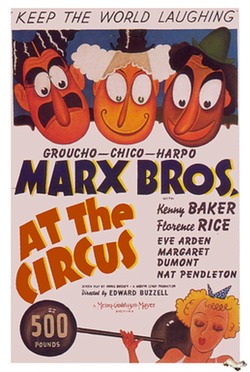
Groucho - John Cheever Loophole, a lawyer
Chico - Antonio Parelli, assistant
Harpo - Punchy, strongman
Sappy Guy - Jeff Wilson (Kenny Baker)
Sappy Girl - Julie Randall (Florence Rice)
Rich Olde Woman - Suzanna Dukesbury (Margaret Dumont)
Bad Guy - John Carter (James Burke)
Femme Fetale - Peerless Pauline (Eve Arden)
Plot: Sappy Guy is the nephew of Rich Olde Woman, who has disinherited him for buying a circus, in which his love, Sappy Girl is the star. Sappy Guy owes Bad Guy 10-large, but is about to pay him off. For reasons mysterious, Bad Guy will be in a bad way if Sappy Guy pays him off(?). Chico and Harpo are circus employees and Chico askes attourney Groucho to come down and help Sappy Guy and Sappy Girl. Bad Guy steals Sappy Guy's ten grand. To raise the stolen money Groucho moves in with Sappy Guy's aunt, Rich Olde Woman, and cons her into paying ten G's for Jardinette, a snotty orchestra conductor, and substituting the circus in Jardinette's place. The ruse works and Jardinette's orchestra floats out to sea and the money is recovered from Bad Guy and they all live happily ever after.
After the marginal achievements of ROOM SERVICE, the team returned to MGM to finish out their career with a string of retread films which would have been dreadful if the Marxes had not been in them. AT THE CIRCUS is the first in a trio of so-so films which are not bad in retrospect, but one get's the feeling that Marxes were just marking time to retirement. As a film, AT THE CIRCUS has the distinction of having the lamest Sappy Guy in Marx history, Kenny Baker. There's hardly a scene with Mr. Baker that one doesn't long to be on the set of the film so they could punch the daylights out of the whimpering sod. It's a wonder that his co-star, Florence Rice, who has twice the character, not to mention spine, would tolerate such a twerp, but that's Hollywood.
First, shall we ponder the musical numbers. The film rose to the task of creating songs that are as unappealing as Kenny Baker, with "Two Blind Loves" and "Take A Bow", the latter of which should have raised the ire of any self-respecting gal in the 40s. Nowdays, it's quite embarassing to see Florence Rice prancing around like a horse to Baker's command. However, Groucho's "Lydia, The Tatooed Lady" is quite clever, and one of the best scenes in the film.
One of the most likeable aspects of the movie is middle section, which takes place on a train. It's kind of a nice throwback to the days when it was people's primary form of transportation. Anyway, romanticisms aside, many of the cabins seem a bit too spacious, but what the hay. The mystery of who stole the money to pay off Bad Guy Mr. Carter is mostly a vehicle to get the Marx's from one cabin to another of the circus train. Probably the most memorable part is when the three Marx's confront Professer Atom (played by Jerry Maren, who handed Dorothy a lollipop as a munchkin in WIZARD OF OZ that same year). At long last we get to hear Harpo say something, even it only is "Atchoo!" twice. (Hear him actually speak here).
Like A DAY AT THE RACES, the Marxes are placed in the kind of setting that is there 'element', which weakens the film. How can the Marx Brothers compete with the goings on at the circus, which means they're just another 'act' in the show, wheras they are at their best when poking fun at highbrow culture, not down in the sawdust. However, they do get their chance at the very end of the film, when the circus plants itself at the mansion of chatelaine Margaret Dumont, and doing up the circus show for the wealthy residents of Newport. Probably the best joke is watching the orchestra floating out to sea whilst performing Beethoven. For the next film, the studio opted for a common ploy for many comedies of the 30s, a period piece, with the Brothers going back a hundred years...
GO WEST (1940)
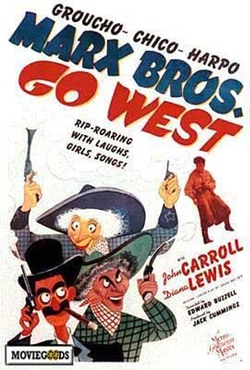
Groucho - S. Quentin Quale
Harpo - Rusty Panello, a prospector
Chico - Joseph Panello, a prospector
Sappy Gal - Eve Wilson (Diana Lewis)
Sappy Guy - Terry Turner (John Caroll)
Rich Olde Woman - n.a.
Bad Guy - Red Baxter (Robert Barrat)
Femme Fatale - Lulabelle (June MacCloy)
Plot: Groucho, Chico and Harpo are headin' west during the Gold Rush. Harpo and Chico wind up in the desert digging for gold during which they are given a deed to Dead Man's Gulch by Sappy Girl's grandfather. Meanwhile Sappy Guy convinces the railroad company to use Dead Man's Gulch for a new railroad line. Bad Guy also wants the deed to Dead Man's Gulch so he can sell it to railroad at a high price. Chico and Harpo meet Bad Guy's cohort and offer to sell him the deed, Groucho interceeds and bids higher than Beecher with the intent of selling the deed back the the bad guys at a high price. The naughty guys steal the deed from Groucho. Chico and Harpo steal it back and a then a big chase ensues with the whole cast to a predicable conclusion of the Sappy Guy and Sappy Girl selling the deed and living happily ever after as the Marxes drive the golden spike.
A sure sign that the idea bag is empty is when writers resort to putting the Marx brothers in an exotic location, like times past. GO WEST was the only Marx film not to be based in modern times. Producers of the film must have been hoping that if the Marxes weren't funny at least the wild west setting would sustain the movie. Straining the theme even further, Harpo and Chico seem to be wearing the same duds they've been in since COCOANUTS, only Groucho has period outfits. Perhaps they arrived via time machine into the old west? Certainly the out of period jokes make one wonder;
"We can't make a phone call, Don Ameche hasn't invented the telephone yet." (referring to the 1939 film "The Story Of Alexander Graham Bell")
"You should have been home, the 'Pot O' Gold' called" (referring to a 40s radio game-show)
"Me no like, me want Cadillac sedan"
One notable thing is that they left Margaret Dumont to sit this one out (though she returned in the next one). But Walter Woolf King returns playing the baddie once again like he did in A NIGHT AT THE OPERA, though he plays a more benign character. Robert Barrat's Red Baxter, the boisterous villan, is quite likeable, kind of like Trantino in DUCK SOUP. Probably the most curious bit of casting is June MacCloy, as Lulabelle, who gives Groucho some chances for his oogling. MacCloy has a surprisingly low voice, that almost sounds like it was dubbed by a male singer. That leaves our Sappy Guy and Gal. Diana Lewis is a petite gal who is given very little to do. Better still is John Caroll, who has a pleasant voice and personality, and sings one of the movies only songs "Riding The Range", a nice cowboy ballad.
As mentioned, there is a big train chase climax, which is passable entertainment, but rather predictable. What's worse, the Marxes are not given that much to do. One of their longest scenes takes place at the train station in the beginning of the film, where Chico swindles Groucho, "One Dollar" at a time. Aside from that, most of their screen-time is moving the plot along. Harpo gets his obligatory harp solo by playing a loom on an Indian reservation. Certainly the gags that are played in that reservation scene will make most of the politically-correct crowd shudder, but there are some good jokes mixed in with all the caucasians pretending to be Native Americans.
There's not much else to say, but it's a pleasent enough diversion, but nothing to get over excited about. It's just another undistinguished latter-day Marx Brothers film. In some ways the followup THE BIG STORE was a bit better, and brought the team back into modern times.
TRIVIA - June MacCloy retired from moviemaking after GO WEST was released. Tully Marshall, who played Sappy Girl's grandfather, was a young lad during the period the movie was based, 1870.
THE BIG STORE (1941)
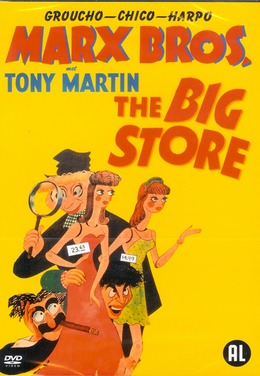
Groucho - Wolf J. Flywheel, a detective
Harpo - Wacky, a chauffuer
Chico - Ravelli, a musician
Sappy Gal - Joan Sutton (Virginia Grey)
Sappy Guy - Tommy Rogers (Tony Martin)
Rich Olde Woman - Martha Phelps (Margaret Dumont)
Bad Guy - Mr. Grover (Douglas Dumbrille)
Femme Fatale - Kitty (Virginia O'Brien)
Plot: Rich Olde Woman owns part of the Phelps Department Store, a major downtown store. Her nephew, Sappy Guy, is going to sell his share of the store and establish a music conservatory, in which Chico is a teacher. Chico attaches himself to Sappy Guy as a "bodyguard". Bad Guy is the store's manager and is planning to bump Sappy Guy off, marry Rich Olde Woman take over the store and then bump her off too and marry Femme Fetale. After an attempt is made on Sappy Guy's life, Rich Olde Woman hires Groucho as Sappy Guy's bodyguard. Lotsa dull things happen and culminate in Bad Guy attempting to kill Sappy Guy with a gun hidden in a camera. Well, the plan backfires (sorry) and Sappy Guy and Rich Olde Woman sell off the store and wonder was if there was any point to this.
In the film's preview, the Marx's are introduced by Louis B. Mayer (who hated them, by the way) and announce THE BIG STORE would be their 'first farewell picture'. Of course they went on to make two more features after this, but this was their last MGM film. Meyer was no doubt glad to be rid of them, but no doubt the Marx's were tiring of making films anyway, as this film attests.
THE BIG STORE is one of those films that tries so hard to be funny that it's not really funny at all. Basically it joins the ranks of so many throw-away films of the 40s, not really bad or good, but an acceptable diversion. The Marx's rise above the boring story and setting as always, but there is a real lack of tension. Like the train ride in AT THE CIRCUS, there's a certain charm to the settings of the department store, which at the time was something that many didn't experience, common as it is today.
Douglas Dumbrille returns as the baddie, and he is as soporific in THE BIG STORE as he was in A DAY AT THE RACES, even more so. On noteable thing was that they let Groucho eschew the wig he had to wear in the previous few films. And of course, Margaret Dumont returns as the object of Groucho's gold-digging desires. Regarding our leads, we have Tony Martin, the famous singer, who's acting style is not-acting, which is a fair shade better than over-acting. His love interest, played by Virginia Grey, is just as uninspired as Martin, though I think this is more of a director's choice, than Ms. Grey's. Grey keeps warning Tony about the danger's that face him, but the worst that happens is that he gets a bump on the head...some danger. The funniest moment, if you're a musician like me, is when Martin plays a song at a piano, with a potted plant to hide his hands (and hide the fact that he can't play piano). Well, due to a gaff in the angle of the shot, you can see him 'faking' in the reflection of the keyboard on the piano.
Oddly enough, one of the better parts of the movie are the musical numbers. The goofy song "Sing While You Sell" is delivered with panache by Groucho, as the employees dance about happily around him. The fashion-show part is quite funny, especially's Groucho's asides to the audience...
"This is a bright red dress, but technicolor is SOOO expensive!"
The other numbers, the ballad "If It's You", and bombastic "Tenament Symphony" are both sung by Tony Martin, are a fare shade better than most of the songs in Marx movies. But without a doubt the best musical part is Harpo and Chico's duet at the piano, which is a delight to watch. Outside of that, Chico and Harpo meander about the store, from one gag to another, so to speak. The strangest is the scene where an italian family tries to buy a bed, and we see lots of strange beds and lots of different ethnic children trying hard to make comedy.
The opening scene at Groucho's detective agency is probably the most brisk, consistant comedy bit in the whole film. Groucho's downplaying of the exploding coffee pot while he tries to impress Dumont is entertaining;
"Winthrop get me Trinidad - hello Dad - tell Mom I won't be home for dinner."
But the 'plot', a dull bit of hijinx around Douglas Dumbrille's plot to take over the department store is so weak that it doesn't really happen. The climax is supposed to be based around a in-store chase that will show up Dumbrille for the crook he is, but is really a series of sped-up film gags, which might have been novel in their time, but look kind dumb today. But no matter, THE BIG STORE is not bad at all, a nice relic of the 40s and has some good tunes and even some nice bits from the brothers. This was their last film for MGM, or a major studio, for that matter. The brothers did other things as WWII erupted, and spent much of their time selling war bonds and working in radio. But after the war ended, they were called back again, in a post-war film about Casablanca...
A NIGHT IN CASABLANCA (1946)
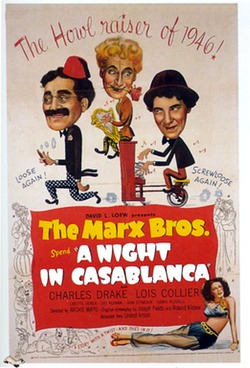
Groucho - Ronald Kornblow, manager
Harpo - Rusty, a valet
Chico - Corbaccio, cabbie
Sappy Gal - Annette (Lois Collier)
Sappy Guy - Lt. Pierre Delbar (Charles Drake)
Rich Olde Woman - n.a.
Bad Guy - Count Settleman/Heinrich Stubel (Sigfried Rhuman)
Femme Fatale - Beatrice Reiner (Lisette Verea)
Plot: In post-war Casablanca, Bad Guy has hidden a stash of Nazi-looted treasure in the Hotel Casablanca and keeps killing managers of the hotel so he can named the manager and flee with the booty. Harpo is Bad Guy's valet and Chico is his camel-renting brother. Groucho becomes the new manager of the hotel and Bad Guy plans to bump him off like the other managers. Femme Fetale assists Bad Guy in a plot to dispose of Groucho. After a bunch of pointless scenes, the Marxes are booted out of the hotel and Bad Guy runs off with the Nazi loot with the Marxes in hot persuit. The not-so-hot persuit leads to the baddies capture and and end to this mess.
About the nicest thing you could say abouth A NIGHT IN CASABLANCA is that it's not as bad as LOVE HAPPY. A NIGHT IN CASABLANCA was to have been the team's swan song (or the last in a series of swan song films - they had previously announced that THE BIG STORE would be their last film) and as such it is like many latter Marx films in that they are the only enjoyable aspect of the film.
The post-war setting in Casablanca had the producers of the classic film, CASABLANCA, a bit perturbed, until Groucho told them off and they dropped their lawsuit threat. However, it does add a bit of intrigue, especially compared with the banal settings fo the THE BIG STORE, but like GO WEST and AT THE CIRCUS, it does seem an attempt to make the Marxes seem more appealing by putting them in novel surroundings. However, the exotic setting is not enough to add sufficient intrigue to the carry the story, which is well stocked with cliché characters.
Speaking of chichéd characters, we'll start with Sigfried Rhuman as a standard-issue meanie Nazi, Heinrich Stubel. Sigfried makes his third appearance in a Marx film (he was also in NIGHT AT THE OPERA & DAY AT THE RACES). His partner in crime is Beatrice Reiner, played by Lisette Verea, a singer in the Hotel. Verea's character is just too goofy to be taken as a seductress or even a torch singer, although she and Groucho make a pretty good comic couple. Verea was a Romanian cabaret singer and this was the only film she ever appeared in. Charles Drake and Lois Collier make about blandest sappy couple in the Marx Brothers canon. They both ooze such a maudlin aire, that one can't feel any sympathy for the. Early in the film we learn that Lieutenant Delbar (Drake) doesn't have any other clothes so all he can wear is his air force uniform - aw, poor guy!
Of course the Marxes carry themselves pretty well. Groucho is at his ascerbic best as Ronald Kornblow. Probably his best scene is when a stuffy old American couple attempt to check into the hotel, - "Sir, this is my wife - you ought to be ashamed!" Groucho "If that's your wife you ought to be ashamed!" There are a few other good scenes, but none come to mind, it's just a case of old men trying to relive former glories, and it just doesn't click. The film's climax recalls THE BIG STORE, as it's another attempt at an action-filled finish to the movie. But it's just another series of bad rear-projection shots and mild slapstick. Groucho was about to become a major sucess with his radio/TV series You Bet Your Life. But for one last time, they would work together on the same film...
LOVE HAPPY (1949)
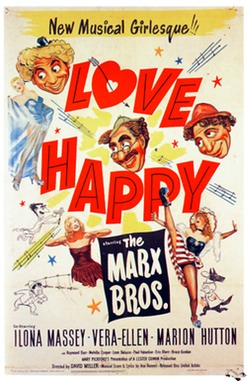
Harpo - Harpo
Chico - Faustino The Great, a mind-reader
Groucho - Sam Grunion, detective & narrator
Sappy Gal - Maggie Phillips (Vera Ellen)
Sappy Guy - Mike Johnson (Paul Valentine)
Femme Fetale - Madame Egelichi (Ilone Massey)
Bad Guy - Lefty Throckmarton (Melville Cooper)
Plot: Bad Guy runs a delicatessan which is a front for a diamond smuggling ring. Femme Fetale has smuggled a diamond necklace in a tin of sardines. Harpo accidentally steals the can of sardines as he's nicking food from the deli for a group of actors puttin' on a show. Chico is also a part of the show. So are Sappy Guy and Sappy Gal and they participate in a bunch of droll musical numbers. The backers of the show pull out, but after Femme Fetale finds out the can is in the theater she offers to back the show. Groucho, the narrator enters the story at the theater and a rooftop chase scene ensues with Harpo walking away with the diamonds, Groucho marries Femme Fetale and Chico plays cards with a dog.
20 years after the team's first film was released, the Marx Brothers collective film career came to an end. It's more of a Bronx cheer than a swan song, but does have its moments, at least one, perhaps two. The fact that LOVE HAPPY is a Marx Brothers film is a twisted tale, but the long and the short of it is that that Harpo wrote the story for LOVE HAPPY as starring vehicle for himself. Then Chico begged his way into the production as he needed the cash and the producers brought Groucho in to complete the team (and so the box office prospects). The film is also of note due to a very brief appearance by Marilyn Monroe (only her second on screen), though the coverbox of the videotape would have you believe she starred in it! Raymond Burr also has a minor part as one of Madame Egelichi's thugs.
Groucho's part is pretty small, setting the stage for the story at the opening, offering some occasional narration. The most notable scene is the quick walk-on bit by Marilyn Monroe in a slinky strapless dress, giving Groucho an opportunity for some genuinely lecherous leers. Then some 30 seconds later, Monroe walks out of the film and into screen history. One of the film's stranger bits is the appearance of an assassin in Groucho's office, who threatens Groucho unless he returns some stolen diamonds. However, by the film's climax, Groucho arrives at the theatre, with no explaination of how he slipped by the assassin.
Which leads to our sappy-chap & sappy-chick. Paul Valentine is a lanky bohemian, who is a watchable and agile dancer, which is not the case with Maggie, played by Vera Ellen. Ellen is a li'l cutie-pie who dances with the grace of a marionette and who's acting almost as wooden. The chief naughty is femme fetale Madame Egelichi. Perhaps my hormones bias me, but I think Ilone Massey (best remembered as an opera singer) is the best of a long line of wicked women in Marx films and one of the few joys watching the film. Anyway, testosterone aside, she plays a seductress spends much of the film in strange get-ups. As the chief naughty of the flim, she doesn't have a lot to do, save act as an object of oogling for the Marxs.
Pehaps the most "scannable" parts of the film are the musical numbers. One features Bunny Dolan (played with energy by Marion Hutton, who also sings the title song) slapping rag dolls around in high-chairs as she belts out "Who Stole That Jam?" as an angry mom belting her kiddies - how charming! Another step down is the "Sadie Thompson Number" in which Maggie's a flirty cupcake on a tropical island full of G.I.s, around which she does a dreadful pastiche of seductive dancing, pounding around the stage in her high-heels as if she were trying to punch holes in the stage floor.
It's also pretty obvious that Chico's (like Groucho's) roles were afterthoughts. Chico meanders around the theater, and hence the film, without much to do. His piano-violin duet with Mr. Lyons is somewhat enjoyable, but save that, he's lost in the cast of characters.
The rooftop climax is novel, though not very enjoyable. As Harpo evades Madame Egelichi's thugs in silly ways in a setting of various product billboards. As a matter of fact, these early bits of product-placement were sold to those companies to help finance the film. But the billboards give that climax something of a nostalgic aire, like leafing through a 1940's magazine just to look at the adverts. But none of this is too memorable, and some is rather painful to watch. And certainly audiences were hardly flocking to this feature they way they had to their films 10 years before, so it was a sure sign that this would be their last farewell picture.
Afterword
After LOVE HAPPY the Marxes has a few moments together, but none worth getting too wrapped up over. But, if anything, the Marxes were troopers to the end. During the 50's all three Marxes kept busy, most of all Groucho with the huge success of the "You Bet Your Life" show on radio, then later on TV. Neither Chico or Harpo had the sustained success that Groucho did, but considering they were all in their 60s and had families, they were doing allright. And they all kept working right to the end of their lives. Groucho was the only one whoe cared to revel in the team's renaissance in the late 1960s (bitter Zeppo sat that out) and even had a revival of his own with his stage production of "An Evening With Groucho" along with several TV appearances - still working in his 80s.
The first post-feature appearance was in Irwin Allen's awful 1957 film, "The Story Of Mankind", which featured all Groucho, Chico and Harpo, but never in the same scene. They did make a sort of reunion in 1959's "The Incredible Jewel Robbery" (30 years after the release of Cocoanuts, by the way) which was a 20 minute pantomime with Harpo and Chico, until Groucho appeared at the end. To my knowledge, this was never released on VHS or DVD, however a search the nether reaches of the net may allow you to obtain a copy in Super-8!
And though it was never broadcast, they finally all worked on a TV pilot in 1960 for a children's programme called "The Deputy Seraph". Chico and Harpo played angels and Groucho was God (a role he 'reprised' in the dreadful 60s film "SKIDOO"). Sadly, Chico's health was so poor that the show was not put into production. Chico passed away in 1961 and Harpo died in 1964. Groucho hung in for 13 years longer before passing on in 1977 at the age of 83. Zeppo passed away in 1979 at the age of 78 after a sucessful career as a Hollywood agent.
The only thing that remains is to mention the best Marx Brothers movie made after they had all passed away...
BRAIN DONORS (1992) (also known as LAME DUCKS)
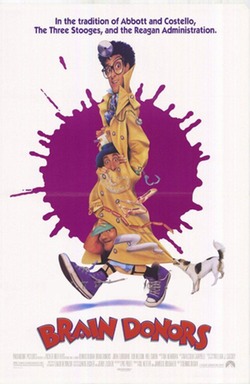
Harpo Character (Bob Nelson) - Jaques
Chico Character (Mel Smith) - Rocco Melonchek
Groucho Character (John Tuturro) - Roland T. Flakfizer
Rich Olde Woman (Nancy Marchand) - Lilian Oglanthorpe
Sappy Gal (Juli Donald) - Lisa La Baron
Sappy Guy - (Spike Alexander) - Alan Grant
Femme Fetale (Teri Copley) - Tina
Bad Guy (George De La Pena) - The Great Volare
Sorta-Bad Guy (John Savident) - Lazlo
Plot: Sorta-Bad Guy is the attourney for Rich Olde Woman, who's late husband wants to establish a ballet company. Groucho-character is and ambulance-chasing attourney for Rich Olde Woman, and wiles his way into the ballet company, bringing along the Chico & Harpo characters along. Bad Guy selects Sappy Girl to be his parter, leaving Sappy Guy without a job in the ballet. Our trio of the Groucho, Chico and Harpo-characters reek havoc upon the ballet and Bad Guy so that Sappy Guy and Sappy Girl will become the stars of the show and then they chase an ambulance into the night.
"A Night At The Ballet"? BRAIN DONORS treads a fine line between homage, remake and parody. On the surface, it is a remake of A NIGHT AT THE OPERA, save it is set in a ballet, but the plot melds aspects of A DAY AT THE RACES as well. Both George S. Kaufman and Morrie Ryskind recieved screen-credit for the story (it was also produced by Paramount Studios, by the way). The film was created by the same team that gave us AIRPLANE, TOP SECRET and the NAKED GUN films, so one would expect it to be full o' laffs, and indeed it is. The amazing thing about this film that was not only a flop, which was the fault of misdirected ad campaign, but that it was only available on VHS for a few nanoseconds back in 1993. But at last, it has been released on DVD, and instead of marketing it like a Three Stooges movie, they are putting it in its proper context. The producers made a wise decision in making the characters along the lines of the Marx Brothers film archetypes, without dressing them up as them. For example, the 'Harpo-character' Jaques, does speak, though his comedy is mostly visual, ala Harpo. Mel Smith's heavy Cockney accent gives the same street-wise character as Chico's, only lacking Chico's patented word mangling. That leaves Tuturro's portrayal as the Groucho, full of mile-a-minute wisecracks and asides. His energetic performance keeps the film at fever pitch and takes several viewings to catch all the gags. Nancy Marchand does a straight-up imitation of Margaret Dumont's stolid straight-woman, but that's not a bad thing, as it makes a perfect foil for Tuturro's jibes.
The villans are well cast, George De La Pena's Roberto Volare is arrogant and condiscending, just as Roldopho Lasparre was in A NIGHT AT THE OPERA, and John Savident as the manipulative Lazlo compleats the nasty duo, ripe for the picking by our makeshift Marx team. One of the best parts of the film are the excellent opening credits, featuring animation done by the legendary Will Vinton, are funny and very well made. Then it's a case of bringing our trio of troublemakers together. Jaques's (Bob Nelson) first scene is remeniscent of the first part of PEE WEE'S BIG ADVENTURE, espeically due to Ira Newborn's cartoon-esque musical score. Tuturro is the ambulance-chasing lawyer and they all meet in a cab driven by Mel Smith (who some may remember from the BBC series NOT THE NINE O'CLOCK NEWS). One thing that's lacking is the Chico/Harpo-like connection between Smith's character and Nelson's character. But one part of the old formula is still in tact, Tuturro's Groucho is still the gold-digging shyster with a smidge of sympathy for the romantic leads. And here, our romantic leads are, as always, suitably bland and uninspiring.
Beyond this point the film follows the plot of OPERA pretty much, just cramming a lot more jokes than any Marx film ever could. After a lot of sparring between the baddies and the goodies, we get to the climax where our Marx-esque team goes to town a production of "Tears Of The Swan" (known also as Swan Lake) and many of the gags are bed-wettingly hilarious. So Paramount makes up for dropping the Marx's over 60 years previously, and it's a shame this film met with such meager appreciation as I would love to have seen a sequel. There was no better tribute than this near-imitation, and that's saying something
